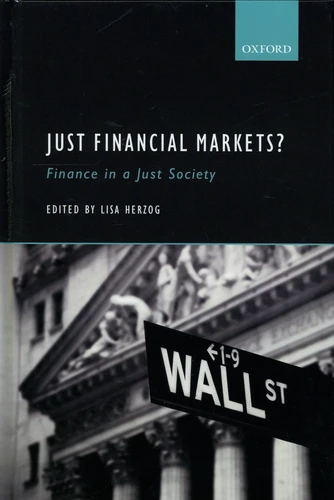Just Financial Markets ?. Finance in a Just Society
Par :Formats :
- Paiement en ligne :
- Livraison à domicile ou en point Mondial Relay entre le 9 juillet et le 19 juilletCet article doit être commandé chez un fournisseur. Votre colis vous sera expédié 8 à 17 jours après la date de votre commande.
- Retrait Click and Collect en magasin gratuit
- Livraison à domicile ou en point Mondial Relay entre le 9 juillet et le 19 juillet
- Nombre de pages335
- PrésentationRelié
- FormatGrand Format
- Poids0.64 kg
- Dimensions16,2 cm × 24,2 cm × 2,4 cm
- ISBN978-0-19-875566-1
- EAN9780198755661
- Date de parution13/06/2017
- ÉditeurOxford University Press
Résumé
Well-functioning financial markets are crucial for the economic well-being and the justice of contemporary societies.The Great Financial Crisis has shown that a perspective that naively trusts in the self-regulating powers of free markets cannot capture what is at stake in understanding and regulating financial markets.The damage done by the Great Financial Crisis, including its distributive consequences, raises serious questions about the justice of financial markets as we know them.
This volume brings together leading scholars from political theory, law, and economics in order to explore the relation between justice and financial markets. Broadening the perspective from a purely economic one to a liberal egalitarian one, the volume explores foundational normative questions about how to conceptualize justice in relation to financial markets, the biases in the legal frameworks of financial markets that produce unjust outcomes, and perspectives of justice on specific institutions and practices in contemporary financial markets.
Written in a clear and accessible language, the volume presents analyses of how financial markets (should) function and how the Great Financial Crisis came about, proposals for how the structures of financial markets could be reformed, and analysis of why reform is not happening at the speed that would be desirable from a perspective of justice.
This volume brings together leading scholars from political theory, law, and economics in order to explore the relation between justice and financial markets. Broadening the perspective from a purely economic one to a liberal egalitarian one, the volume explores foundational normative questions about how to conceptualize justice in relation to financial markets, the biases in the legal frameworks of financial markets that produce unjust outcomes, and perspectives of justice on specific institutions and practices in contemporary financial markets.
Written in a clear and accessible language, the volume presents analyses of how financial markets (should) function and how the Great Financial Crisis came about, proposals for how the structures of financial markets could be reformed, and analysis of why reform is not happening at the speed that would be desirable from a perspective of justice.
Well-functioning financial markets are crucial for the economic well-being and the justice of contemporary societies.The Great Financial Crisis has shown that a perspective that naively trusts in the self-regulating powers of free markets cannot capture what is at stake in understanding and regulating financial markets.The damage done by the Great Financial Crisis, including its distributive consequences, raises serious questions about the justice of financial markets as we know them.
This volume brings together leading scholars from political theory, law, and economics in order to explore the relation between justice and financial markets. Broadening the perspective from a purely economic one to a liberal egalitarian one, the volume explores foundational normative questions about how to conceptualize justice in relation to financial markets, the biases in the legal frameworks of financial markets that produce unjust outcomes, and perspectives of justice on specific institutions and practices in contemporary financial markets.
Written in a clear and accessible language, the volume presents analyses of how financial markets (should) function and how the Great Financial Crisis came about, proposals for how the structures of financial markets could be reformed, and analysis of why reform is not happening at the speed that would be desirable from a perspective of justice.
This volume brings together leading scholars from political theory, law, and economics in order to explore the relation between justice and financial markets. Broadening the perspective from a purely economic one to a liberal egalitarian one, the volume explores foundational normative questions about how to conceptualize justice in relation to financial markets, the biases in the legal frameworks of financial markets that produce unjust outcomes, and perspectives of justice on specific institutions and practices in contemporary financial markets.
Written in a clear and accessible language, the volume presents analyses of how financial markets (should) function and how the Great Financial Crisis came about, proposals for how the structures of financial markets could be reformed, and analysis of why reform is not happening at the speed that would be desirable from a perspective of justice.


